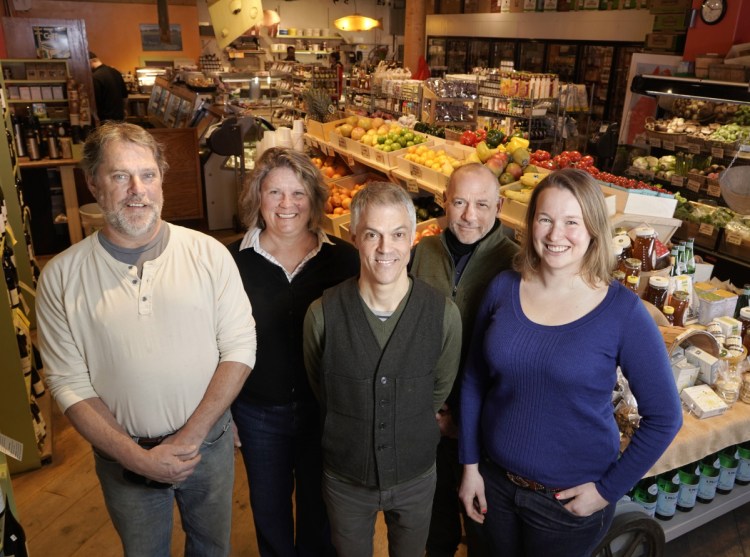When John Naylor and Scott Anderson decided to start their own little market on Brighton Avenue, all they wanted was a place that would allow Portlanders to shop like Europeans. It would be a place where shoppers would stop in a few times a week to get fresh, high-quality products and discover, as Naylor put it, “another way to live and eat.”
Some of those products were local – their chickens came from Merrymeeting Farm in Bowdoinham, for instance – but they didn’t have to be.
But soon after they opened the first Rosemont market in January 2005, their idea begin to evolve. They started connecting with people like Martha Putnam of Farm Fresh Connection, who suggested they sell local spring-dug parsnips.
“I had no idea what a spring parsnip was,” Naylor said. “I found out what it was, and that it was really kind of special and cool, and the next thing you know we started to develop closer relationships with more farms.”
At the same time, Naylor said, he and Anderson were learning from customers, who were themselves becoming ever more interested in the source of their food.
“With a lot of hard work, a little luck, and being at the right place at the right time,” he said, “we’ve been able to form a good ideology and a great company.”
Today, Rosemont is more than a charming European-style market. It is, our judges said in selecting it for a Source Entrepreneur award, “a convenience store that is not selling cigarettes and crap food.” It is a model for how, in this day of megamarkets and online grocery ordering, small, neighborhood grocers can still survive – and thrive, they added. It is an anchor that has built community by providing good food to customers and fair prices to farmers. And it’s a model that can be replicated, as Rosemont itself has shown.
Since 2005, Rosemont has grown from some six employees to about 100 full- and part-time staffers who work in six markets in Portland, Yarmouth and Cape Elizabeth. The business also has a warehouse, an events-planning wing, and delivery service to the Casco Bay islands. The market works with roughly 70 farmers, and Naylor is justly proud of its “deep relationship” with Maine’s farm community.
“We’re not going to leave them hanging,” he said. “We’re going to work with them, we’re going to support them. We’re going to pay them what they need to be paid.”
That means shoppers may pay more for their bag of groceries at Rosemont than at a supermarket, a fact that has not been lost on Naylor. He volunteers with the Portland Food Council and other groups that address issues of food insecurity. “For people who can’t afford it,” he asked, “how do we get the food into their hands?”
Mark Lapping, an emeritus professor in policy, planning and management at the University of Southern Maine, former executive director of the Muskie School of Public Service, and founder of the Maine Food Strategy, an initiative to grow the state’s food economy, says Rosemont has helped to make local food more accessible and “real,” blemishes and all. Eggplants look like eggplants, and apples look like apples as nature intended them to be.
“We have this almost airbrushed sense of what food looks like,” Lapping said, “and one of the real contributions at the market has been to show us what real food looks like.”
Rosemont’s connections with farmers have helped keep money in the local economy, Lapping said.
“As the local food movement grows, we see that the big corporate supermarkets are trying to ape that,” he said. “You can go into the vegetable and fruit sections, and they now tell you which farm this comes from. And I think that started with the Rosemonts.”
The original Brighton Avenue market has had an unintended effect on its neighborhood. Sarah Delisle, president of the Rosemont Neighborhood Association and a real estate agent, says it has made the area more attractive to homebuyers, who often ask to see properties that are “walkable to Rosemont.” Agents, herself included, use the market in advertising properties.
That doesn’t surprise Lapping.
“It’s not only a landmark, it’s a quality mark,” he said. “If there’s a Rosemont there, it says something about the neighborhood around it.”
Delisle has lived just three blocks from the original Rosemont for eight years.
“I’m probably there two times a week, at least, and I feel like most neighbors are,” she said. “It’s a real community place.”
Meredith Goad can be contacted at 791-6332 or at:
mgoad@pressherald.com
Twitter: Meredith Goad
Send questions/comments to the editors.




Success. Please wait for the page to reload. If the page does not reload within 5 seconds, please refresh the page.
Enter your email and password to access comments.
Hi, to comment on stories you must . This profile is in addition to your subscription and website login.
Already have a commenting profile? .
Invalid username/password.
Please check your email to confirm and complete your registration.
Only subscribers are eligible to post comments. Please subscribe or login first for digital access. Here’s why.
Use the form below to reset your password. When you've submitted your account email, we will send an email with a reset code.